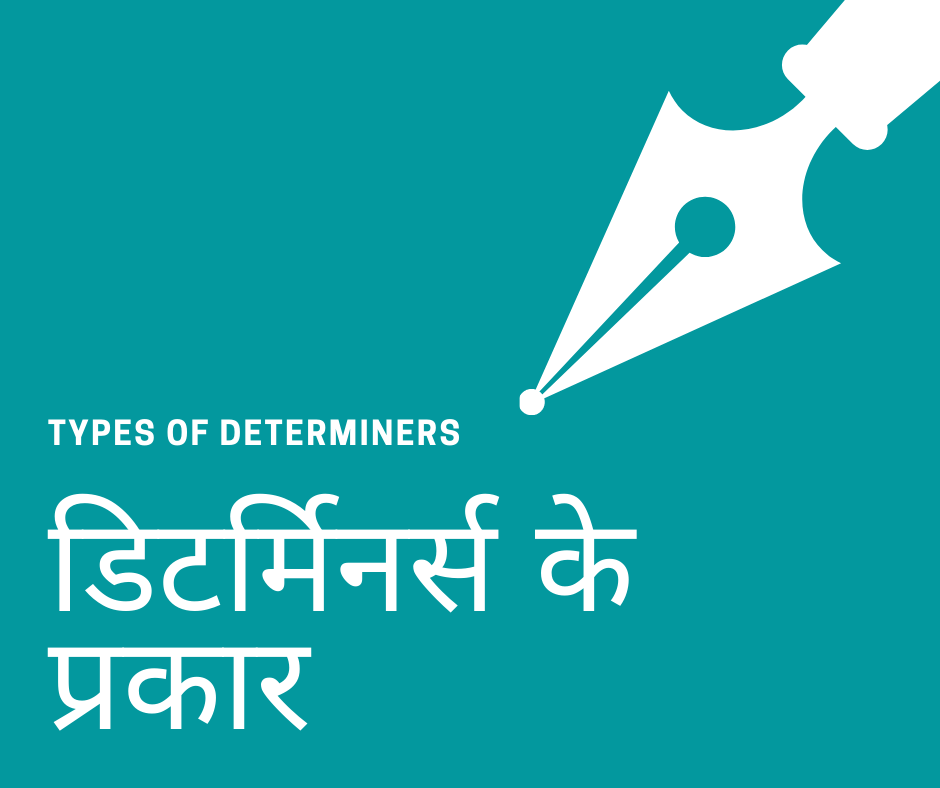डिटर्मिनर्स के प्रकार (Determiners ke prakar)

Overview
इस लेख में हम अंग्रेजी के एक महत्त्वपूर्ण अध्याय के बारे में जानेंगे - Types of Determiners in Hindi
डिटर्मिनर्स के कार्य और प्रकार
डिटर्मिनर्स के दो मुख्य कार्य होते हैं:
संज्ञाओं को संदर्भित (refer) करना - वे संज्ञाओं के संदर्भ को अधिक विशिष्ट या सामान्य बनाते हैं
संज्ञा की सँख्या बताना
संज्ञाओं को संदर्भित (refer) करना
संदर्भित करने या रेफ़रिंग का अर्थ है, हमें यह दिखाना कि संज्ञा किसकी ओर इशारा कर रही है या किस बारे में बात कर रही है। अर्थार्थ, डिटर्मिनर्स यह दर्शाते हैं कि संज्ञा किसकी ओर इशारा कर रही है या किस बारे में बात कर रही है|
वे पाठक या श्रोता को बताते हैं कि हम किसी विशिष्ट या सामान्य चीज़ की बात कर रहे हैं।
सामान्य डिटर्मिनर्स (General determiners) - इसका उपयोग तब किया जाता है जब हम लोगों या चीजों के बारे में अनिश्चित (indefinite) तरीके से बात कर रहे होते हैं।
विशिष्ट डिटर्मिनर्स - इसका उपयोग तब किया जाता है जब हम विशिष्ट (specific) लोगों या चीजों के बारे में बात कर रहे होते हैं।
सबसे सामान्य प्रकार के डिटर्मिनर्स जिनका हम संदर्भ देने के लिए उपयोग करते हैं वे articles, demonstratives and possessives हैं।
Articles
यानी, a/an, the
- अनिश्चित (INDEFINITE) ARTICLES (a, an) - यह सामान्य डिटर्मिनर्स हैं, क्योंकि संज्ञा के सामान्य संस्करण को संदर्भित किया जाता है।
A man came into the shop.
An honest person would not cheat.
- निश्चित (DEFINITE) ARTICLE (the) - यह विशिष्ट डिटर्मिनर है, क्योंकि विशिष्ट संज्ञा को संदर्भित किया जाता है।
The cop chased the thugs.

Demonstratives
अर्थात्, Demonstrative सर्वनाम: this, that, these, those
यह विशिष्ट डिटर्मिनर्स हैं - इनका उपयोग वाक्य के भीतर किसी विशिष्ट संज्ञा को इंगित करने के लिए किया जाता है।
वे वक्ता के संबंध में किसी चीज की दूरी निर्दिष्ट करते हैं (जगह या समय में)।
This & These - निकटवर्ती संज्ञाओं के लिए (जगह या समय में)
That & Those - उन संज्ञाओं के लिए जो थोड़ी दूर हैं (जगह या समय में)
This car is better than that one.
These grapes are greener than those ones.
This summer is the warmest I can remember.
Possessives
यह विशिष्ट डिटर्मिनर्स हैं - ये ऐसे शब्द हैं जिनका उपयोग विशिष्ट स्वामित्व (संज्ञा का) दिखाने के लिए किया जाता है।
- Possessive determiners: my, your, his, her, its, your, our, their
I gave my bike to her brother.
Possessive determiners, जो संज्ञा / संज्ञा वाक्यांश के साथ इस्तेमाल किये जाते हैं, वे Possessive pronouns (जैसे की mine, hers, ours, yours, theirs आदि) के समान नहीं होते हैं, जो अकेले इस्तेमाल किये जा सकते हैं।
This is my pen. (possessive determiner)
This pen is mine. (possessive pronoun)
- Possessive case of nouns: x’s (possessive ’s)
Mragank’s new job is awesome.
वे अन्य डिटर्मिनर्स के साथ भी इस्तेमाल किये जा सकते हैं।
I spoiled my mother's rug. (यहाँ mother's को my के साथ इस्तेमाल किया गया है)
Interrogatives
यानी, which, whose and what
 नोट
नोट'Whose' interrogatives साथ-साथ possessives की श्रेणी में भी आता है।
- Which और whose विशिष्ट डिटर्मिनर्स हैं।
Here are the books you ordered. Which book do you think is the most interesting?
Which library did you go to?
Whose book is that?
- What सामान्य डिटर्मिनर है
What food do you like?
I don’t know what job she does.
Quantifying Determiners
'क्वांटिफाइंग' का अर्थ है यह दिखाना कि कोई चीज़ कितनी है - संख्या या मात्रा में।
सबसे सामान्य प्रकार के डिटर्मिनर्स जिनका उपयोग हम संख्या या मात्रा बताने के लिए करते हैं, वे हैं Quantifiers, Numbers and Distributives।
Quantifiers (क्वांटिफायर)
अर्थात् (a) few, fewer, (a) little, many, much, more, most, some, any, a lot of आदि।
वे इंगित करते हैं कि संज्ञा की कितनी मात्रा की बात हो रही है।
I’ve got some milk but I haven’t got any tea.
Only a few experts know the answer to that.
सही quantifier का चयन आपके गणनीय (Countable) और गैर-गणनीय (Non-Countable) संज्ञाओं के बीच के अंतर को समझने पर निर्भर करता है।
Numbers
cardinal - कार्डिनल (one, two, three…), और ordinal - क्रमसूचक (first, second, third…)
Four rebels were found hiding in the basement.
Nadal lost in the second round of the French open.
व्याकरण की दृष्टि से, next, last, another, previous, subsequent, शब्दों को भी क्रमिक संख्या (ordinal) माना जा सकता है। (कुछ लोग उन्हें सामान्य ordinals कहते हैं)
It rained on the last day of our holiday.
The next house is the one where Mr. Antonio lives.
I want another glass of milk.
Distributives
अर्थात्, all, both, no, half, either, neither, each, every
Each child was vaccinated.
Every troop was given a helmet to wear.

अतिरिक्त पुस्तकें और उपकरण
यदि आप किताबों के माध्यम से सीखना पसंद करते हैं, या संदर्भ उद्देश्यों के लिए कुछ अच्छी अंग्रेज़ी व्याकरण किताबें चाहते हैं, तो आप हमारा यह लेख पढ़ सकते हैं|